The Best Solutions for Road Dust Control in Texas
Road dust control can be a significant problem for drivers and residents across the Lone Star State. Dust can cause poor air quality, visibility issues, and even property damage along highways and rural roads.
Fortunately, from using water trucks to applying chemical dust suppressants, there are various solutions available for controlling road dust.

In this article, we will explore some of the best road dust control options so you can make an informed decision about which method suits your needs.
Why Should You Try to Control Road Dust?
Driving on gravel roads during the arid summer months can cause dust to become airborne. Once in the air, dust can be inhaled and irritate respiratory symptoms like asthma and can be especially detrimental to infants and the elderly.
In addition to adversely affecting health, road dust can damage vehicles, homes, and livestock. These damages can become costly and add up over time.
Why Are Texas Roads So Dusty?
Texas’s dry climate and parched earth can cause the gravel on roads to become loose and dehydrated. As vehicles drive over this gravel, dust becomes airborne and creates visible clouds of particulates.
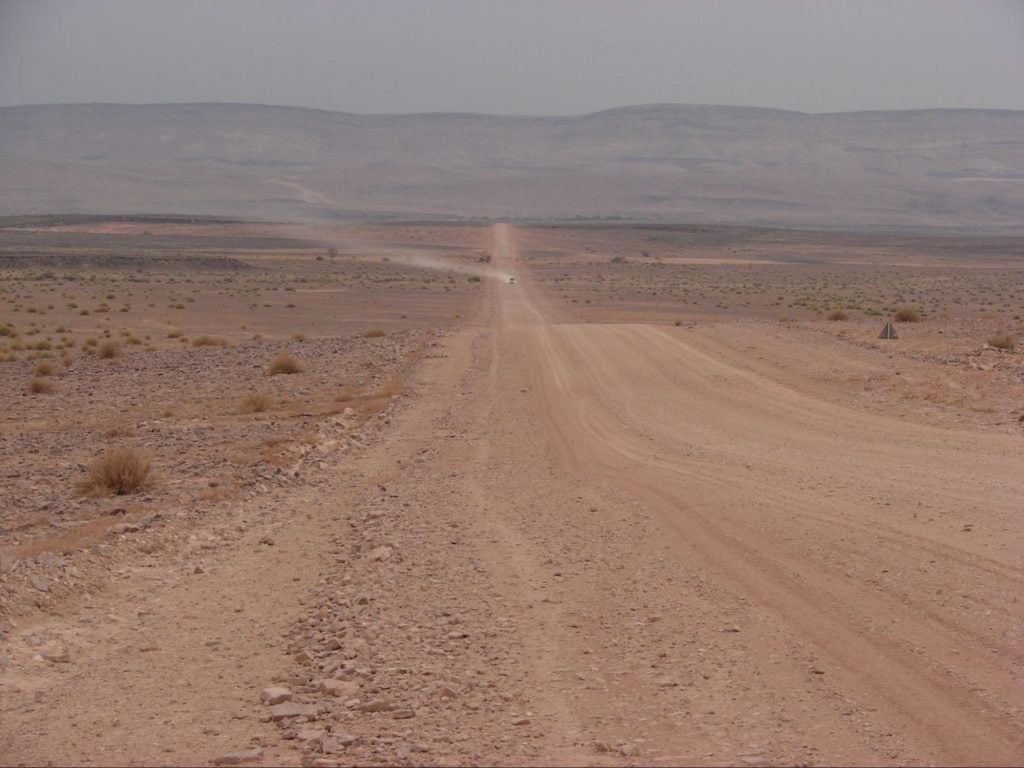
The state’s significant winds make road dust control even more difficult as strong, sustained gusts create new dust clouds and quickly mobilize existing ones.
Without consistent rain to hydrate and tamp down the roads, there are no mechanisms to create natural road dust control.
Why is Road Dust Control Especially Important in Texas?
Road dust control is essential in Texas because of the state’s dry climate and high winds, which can cause dust to become a health hazard for residents. Dust from roads can have adverse effects on respiratory and cardiovascular health. Dust can also affect visibility on the roads, which can lead to an increased risk of accidents. Additionally, dust from roads can damage vehicles and reduce the lifespan of roads.
5 Great Solutions for Texas Road Dust Control
1. TRUEGRID Permeable Pavers
TRUEGRID permeable pavers are plastic grid-style pavers that offer unparalleled dust control.
Once installed, you can pour gravel into TRUEGRID’s PRO LITE and PRO PLUS. The gravel is then contained in the plastic grid, to prevent gravel from being churned up by chunky tires and turned into dust.
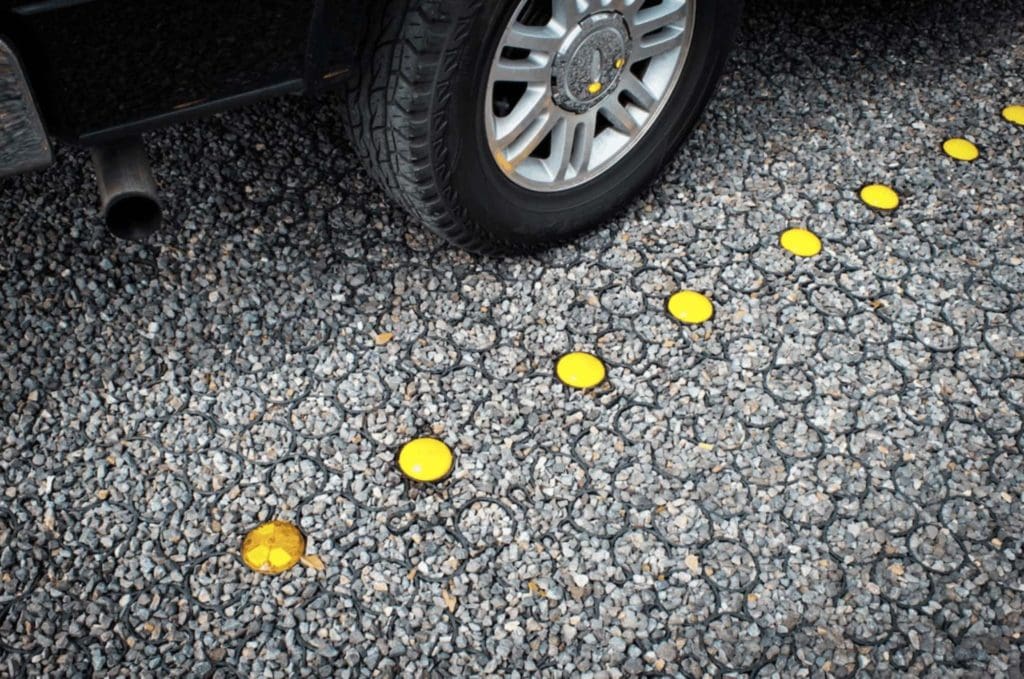
TRUEGRID permeable pavers are made from 100% post-consumer recycled HDPE plastic. The pavers will not affect plant life, groundwater, or local animals, which makes them a safe, eco-friendly option for dust control.
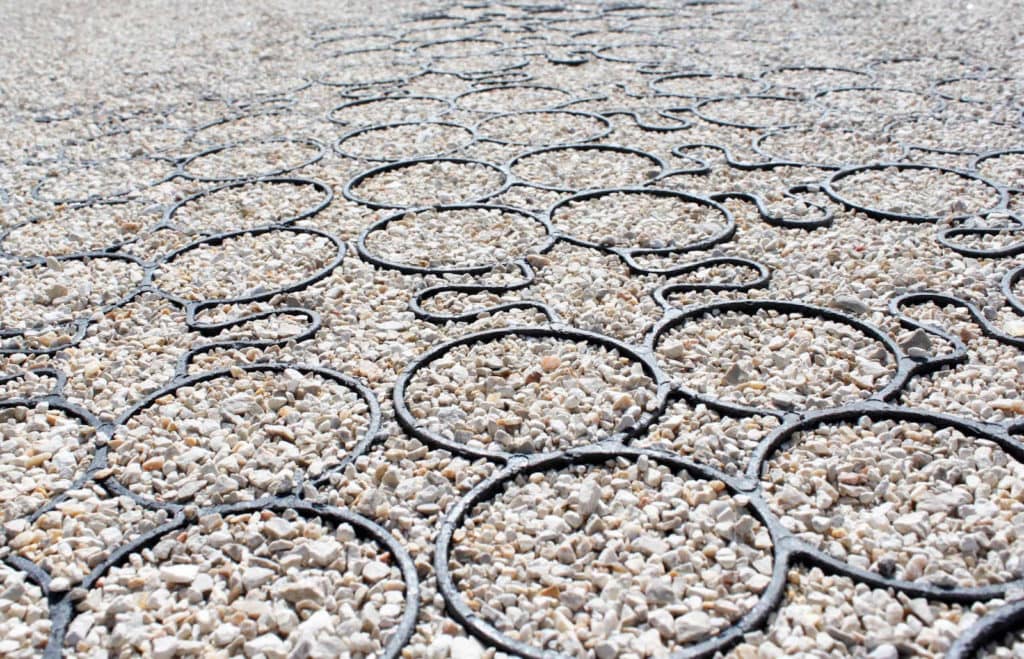
In addition to being safe and non-toxic, TRUEGRID pavers are a cost-effective solution to Texas road dust control. Unlike other road dust control methods, permeable pavers are a one-time installation and remain maintenance-free for the rest of their use.
2. Spraying Water
One of the most common solutions for dusty roads is spraying water, to hydrate the top layer of gravel and tamp down dust.
Commonly used in construction projects and commercial farming, specialized water trucks can spray water on a gravel road as it slowly drives along.
A typical residential solution for Texas road dust control is to set up a sprinkler to water the road directly in front of a home. The water from the sprinkler hydrates the road and helps to minimize dust as cars and trucks drive by a resident’s home.
Although water is a wonderful, non-toxic option for Texas dust control, it is not a long-lasting solution. The blistering Texas sun will cause the water to evaporate rapidly, which results in a nearly constant need for hydration.
3. Calcium Chloride
Calcium chloride is hygroscopic, meaning it can absorb and retain water from the air. Being hygroscopic is beneficial for Texas road dust control because it aids in keeping the gravel moist even during the sweltering Texas summers.
Unfortunately, while calcium chloride can significantly decrease road dust, it can also negatively affect your water supply, adversely affect local plant and animal life, and cause soil salinization.
4. Oil
Spraying gravel roads with used lubrication oil is a common way to reduce road dust. Once dried, the oil creates a durable crust that effectively prevents dust from becoming airborne.
As appealing as it may be to use oil for road dust control, you should note that this practice may have some negative consequences, including;
- Negative effects on surrounding plant life
- Tainted soil quality
- Contaminated groundwater supply
- Increased likelihood of potholes once the crust deteriorates
5. Windbreaks
Windbreaks are strategically placed, manufactured structures, naturally grown vegetation, or organic geographic features that prevent wind from affecting a particular area.
While they won’t prevent dust from being kicked up by vehicle traffic, windbreaks can be a great way to prevent dust clouds from forming from excessive wind. In addition, windbreaks can help prevent dust from blowing into residential and livestock areas.
Use TRUEGRID for the Best Solution to Texas Dust Control
Founded in 2013, TRUEGRID’s permeable pavers have been keeping gravel roads dust-free across the country and the globe, and recycling millions of pounds of plastic in the process.
Offering three different product lines, the ROOT, PRO LITE, and PRO PLUS, TRUEGRID permeable pavers can be used for commercial and residential applications using gravel or grass.
Don’t settle for another summer of dusty roads, and don’t sacrifice the health of your land in the process. Contact TRUEGRID for a free estimate today and find out how you can be true to your project and true to your environment with TRUEGRID!
An easy paving system is an attractive option for those who want a quick and straightforward installation process.
These systems can be ideal for homeowners, property managers, and contractors looking to make a quick and efficient update to their driveway, patio, or walkway.

This article will explore five easy paving systems that you can install quickly without needing specialized equipment or expertise.
From interlocking pavers to roll-out mats, we will go over the benefits and drawbacks of each option, making it easier for you to choose the perfect surface for your next project.
What Is An Easy Paving System?
An easy paving system refers to a method of paving that is relatively simple and straightforward to install. Easy paving systems can include various paving materials and techniques, but typically refer to an alternative to traditional asphalt or concrete.
Easy paving systems should be able to be installed easily and efficiently without specialized equipment or expertise.
Why Use An Easy Paving System?
There are several reasons why someone might choose to use an easy paving system:
- Efficiency: Easy paving systems can be installed quickly, to benefit those on a tight deadline or who need to complete the project as soon as possible.
- Cost-effective: Easy paving systems can be less expensive to install than traditional paving methods because they typically require less labor and equipment.
- DIY-friendly: Easy paving systems are designed to be installed by homeowners or property managers, which can save on labor costs and give them the satisfaction of doing it themselves.
- Low-maintenance: Easy paving systems are designed to require little maintenance to save time and money in the long run.
- Versatility: Easy paving systems can be used for various applications, including driveways, patios, sidewalks, and more.
- Environmentally-friendly: Some easy paving systems are made of recycled materials to help reduce the project’s environmental impact.
- Drainage: Easy paving systems like permeable pavers or self-binding gravel can allow water to pass through, to reduce standing water and flooding, and recharge the groundwater.
It’s important to note that not all easy paving systems are suitable for all applications, and their durability and longevity may vary, so it’s essential to evaluate the suitability of the design for the intended use and location.
5 Types of Easy Paving Systems
1. TRUEGRID Permeable Pavers
When it comes to easy paving systems, it’s hard to beat TRUEGRID permeable pavers.
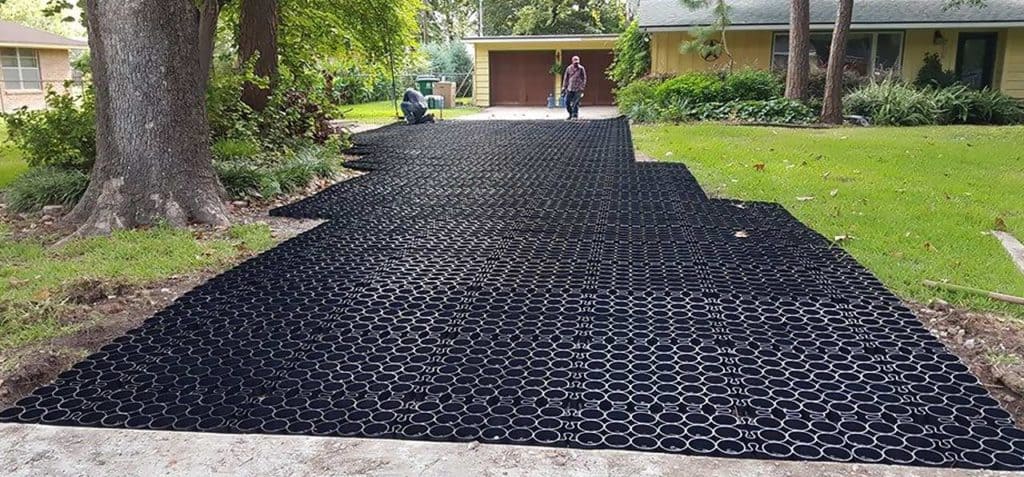
TRUEGRID permeable pavers are a plastic grid-style paving system made in the USA from 100% post-consumer recycled HDPE plastic, and they are virtually maintenance-free. TRUEGRID’s pavers can be filled with grass or gravel and used for commercial and residential applications.
TRUEGRID permeable pavers are an affordable, easy-to-install, and extremely durable alternative to asphalt and concrete that will not shift or crack over time. In addition, the porous nature of TRUEGRID pavers allows stormwater to drain down into the earth, to restore valuable groundwater supplies.
2. Interlocking Brick/Pavers
Interlocking pavers are a type of paving material designed to fit together like puzzle pieces, which eliminates the need for mortar to make installation fast and easy.
They come in a variety of colors, shapes, and sizes, making them a versatile and customizable option for paving driveways, patios, walkways, and more. In addition to easy installation, interlocking pavers are easy to repair since you can remove and replace a single damaged paver.
Unfortunately, interlocking pavers tend to be more expensive than other easy paving systems and are known to settle over time and become uneven. It is also common for weeds to grow up through the joints in the pavers if they are not adequately maintained.
3. Cobblestones
Cobblestones are a traditional paving system commonly found on old European roads and the historic downtowns of New England.
Cobblestones are similar to interlocking pavers or brick, but their aesthetic is a bit more rustic. The gap between stones provides ample drainage for stormwater.
Cobblestones will typically be more expensive than most other easy paving systems and, given their rustic nature, will produce a very uneven finished surface. Like interlocking paver systems, cobblestones are prone to settling and shifting over time, which results in an even less flat driving or walking surface.
4. Rigid Plastic Pavers
Rigid plastic pavers are usually hexagonal in shape and open-celled, meaning that the hole in the hexagon is facing up.
Rigid plastic pavers do not require sealers or other treatments and are very lightweight, to make installation a breeze. The hexagonal gaps provide excellent drainage and create the ability for grass to grow up through, to create a green space. In addition, these pavers are often made from recycled material, to reduce their environmental footprint.
Rigid plastic pavers can support light-duty loads, but you should not use them in commercial settings or applications that need to support extreme weights. The weight limit of these pavers can limit their applications, which makes them a better choice for walkways and patios than driveways and parking areas.
5. Rolled Plastic Paving
Rolled plastic paving is a type of paving material made from recycled plastic that is rolled out and installed like a traditional turf or sod. Less expensive and easier to install than conventional paving materials, rolled plastic paving is lightweight and can be cut to fit any size or area.
The downsides are that rolled plastic paving is less durable and is not recommended for driveways or commercial applications, which limits its applications. In addition, rolled pavers can retain their “rolled” shape when installed showing waves when placed on the ground.
Use TRUEGRID For an Easy Paving System That is Durable and Eco-Friendly
Are you looking for a paving system that is lightweight and easy to install without sacrificing strength and durability? If so, then TRUEGRID has you covered!
TRUEGRID’s PRO PLUS is the only permeable paving option with the compressive and tensile strength to handle commercial traffic. The PRO LITE and ROOT can transform your residential driveways and patios into eco-friendly spaces that look as good to your friends as they feel in your wallet.
Founded in 2013, TRUEGRID’s 100% post-consumer recycled HDPE pavers have saved millions of pounds of plastic from floating in our oceans and have returned millions of gallons of precipitation to local groundwater supplies.
Want to find out more about TRUEGRID? Contact us today, or get a free quote online from the comfort of your home, and find out how you can be true to your project and true to your environment with TRUEGRID.
Utilizing permeable paving in Seattle is a sustainable solution for managing the ample stormwater runoff created by the persistent precipitation of the Pacific Northwest.
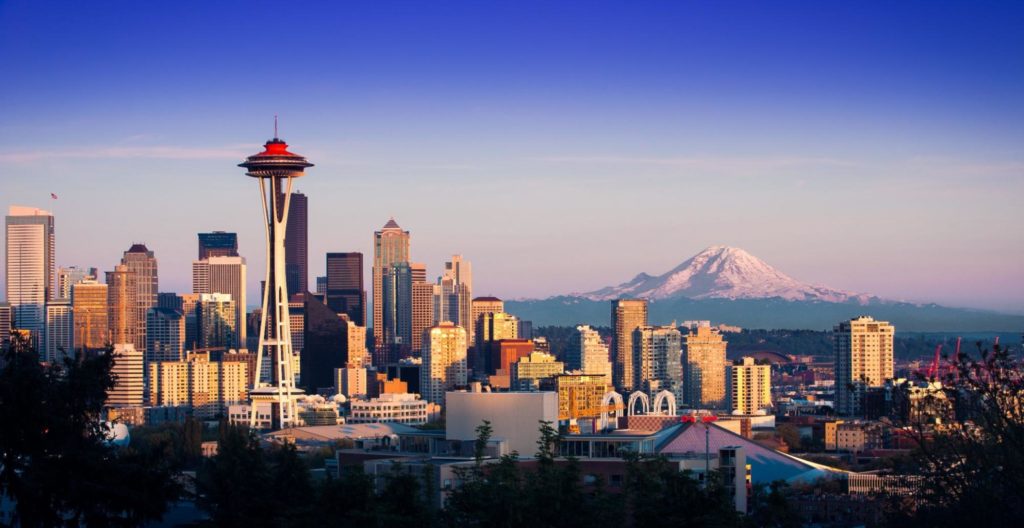
Permeable paving allows water to permeate through the surface, which reduces the amount of water that runs off into the stormwater system and replenishes the groundwater.
There are various options for permeable paving materials, patterns, and designs, so it can be challenging to decide which is the best for your project. This article will discuss the best options for permeable paving in Seattle, including the benefits and drawbacks of different materials, patterns, and designs, in order to help you make an informed decision.
What is Permeable Paving?
Permeable paving refers to a type of pavement or surface that allows water to pass through it rather than run off. Permeable paving can include a variety of materials and techniques, such as porous bricks, open paver patterns, and plastic grid-style systems.
Water permeable materials have small openings or pores that allow water to pass through them and be absorbed into the ground rather than running off and becoming stormwater runoff.
Permeable paving is useful for various applications, including driveways, sidewalks, patios, and parking lots. The purpose of permeable paving is to reduce the amount of stormwater runoff and replenish the area’s groundwater.
Why Use Permeable Pavers in Seattle?
Seattle has many paved roads and concrete sidewalks, which makes it largely impermeable. This impermeability can strain the city’s sewage and drainage systems and deprive the area of crucial groundwater supply. Using permeable pavers in Seattle can help to remedy these issues by allowing water to pass through their surface down into the soil below.
Permeable Paver Options
There are several options for permeable pavers in Seattle, but the three that are most common are:
- Plastic grid systems
- Open paver pattern
- Porous bricks
These options have advantages and disadvantages when building durable driving and walking surfaces that need to allow for water absorption.
Plastic Grid Systems
Plastic grid permeable paving systems, like the paving solutions manufactured by TRUEGRID, are permeable pavers that use plastic grids filled with gravel or grass to create a porous surface. The grids are made from durable plastic that can withstand heavy loads and extreme weather conditions.

The grids interlock together to create a stable surface for vehicles and pedestrians while also allowing water to pass through and infiltrate into the ground below. The grids are filled with gravel, grass, or other materials, which will help to keep the surface stable and prevent erosion.
There are several advantages to using a plastic grid system for permeable paving:
Durability
The plastic material is highly resistant to cracking, warping, and fading, which makes it a durable and low-maintenance option.
Cost-effective
The plastic grid system is less expensive than traditional paving options such as concrete, asphalt, or pavers.
Easy Installation
The grid system is lightweight and easy to install, which can save on labor costs.
Eco-friendly
Grids made by TRUEGRID are made from 100% post-consumer recycled HDPE plastic.
Porous Bricks
Porous bricks are bricks that have small holes or pores in them. These pores allow air and water to pass through the brick, which can be beneficial for various construction applications.
Porous bricks are good for drainage because the small holes or pores in the bricks allow water to pass through them. When porous bricks are used as alternatives to paving, they can help to improve drainage by allowing water to percolate through the soil rather than remaining on the surface. This porosity prevents water from pooling on the surface, which can lead to erosion and other issues. Additionally, porous bricks can help improve drainage by allowing excess water to be rapidly absorbed into the soil, which can help reduce the risk of flooding and water damage while also helping to replenish groundwater.
Porous bricks can be an effective option for permeable paving in Seattle, however there are also some potential drawbacks, including:
Cost
Porous bricks can be more expensive than other permeable paving options, such as porous asphalt or permeable concrete. This can make them less cost-effective for large projects or tight budgets.
Installation
Porous bricks may require specialized equipment and trained professionals to install them properly. This can add to the project’s overall cost and make it more difficult to find a qualified contractor.
Durability
Porous bricks can be less durable than their more solid counterparts due to their honeycomb structure. In addition, an area that experiences significant cold and frost heaves can warp and raise brick and paver installations.
Open Paver Patterns
Open paver patterns refer to the way that pavers are laid out and arranged on a surface. An open paver pattern is one in which the pavers are laid so that they have significant gaps or spaces between them, as opposed to a closed pattern, in which the pavers are laid close together.
The more significant gaps between pavers laid in an open pattern can allow water to pass through, which prevents water from pooling on the surface or draining into Seattle’s streets and sewers.
An open paver pattern can be an excellent option for permeable paving in Seattle, but there can also be some drawbacks:
Shifting
An open paver pattern is more susceptible to shifting, which can cause individual pavers to rise and sink, and could create an unsightly tripping hazard.
Installation
Installing pavers can require a lot of hard manual labor and experience, and may require specialty tools and trained professionals.
Cost
Pavers can be expensive, especially when compared to plastic grid systems.
Use TRUEGRID Permeable Pavers in Seattle for Durable, Eco-Friendly Paving Alternatives
Are you a Seattle resident that is sick and tired of dealing with standing water and flooding in your neighborhood? TRUEGRID’s permeable pavers are the solution you have been waiting for!

TRUEGRID’s eco-friendly pavers are manufactured in the USA from 100% post-consumer recycled HDPE. Whether you want to embrace Seattle’s rainforest heritage by building a grass driveway with the ROOT grass pavers or create a durable, maintenance-free gravel parking lot with the PRO PLUS, TRUEGRID has you covered.
Take action and make a difference by choosing TRUEGRID’s permeable paving for your next project. Contact us today to learn more or get a free estimate!
Road dust control oil; it’s not exactly what comes to mind when country music singers are reminiscing about driving down a dirt road.
However, people who commute on gravel roads every day know that dust control is necessary, especially in the arid summer months.

Why use road dust control oil? Are there negative side effects? What are the alternatives? It can feel overwhelming to have so many questions about safe and effective dust control. Fortunately, armed with the information in this article, you can be confident that you are making informed decisions.
Why Do You Need Road Dust Control?
As the weather gets hot and dry in the summer, vehicles driving on gravel roads begin to stir up an alarming amount of dust. Once airborne, the particulates can produce a thick layer of dust on other cars and homes and cause damage not just to property, but to livestock and loved ones as well.
Inhaling dust can damage your lungs and trigger respiratory symptoms like asthma. Infants and the elderly are especially susceptible to adverse effects from these types of dust clouds.
Road Dust Control Oil
Road dust control oil is one of the most commonly used solutions for controlling dusty gravel. Often utilizing used lubrication oil, gravel or dirt roads are sprayed with oil to create a crust on the road’s surface. Once dried, this durable crust reliably minimizes dust for most, if not all, of the season.
Road dust control oil may seem like a perfect solution, however there are a few significant downsides.
- Spraying oil on the road may adversely affect the surrounding vegetation, soil, and water supplies.
- Once the crust deteriorates, the road may be more susceptible to issues like potholes.
Road Dust Control Oil Alternatives
With the negative factors associated with road dust control oil, you may find yourself looking for alternatives. Fortunately, there are several practical alternatives on the market:
Permeable Pavers
Though relatively new to the market by comparison, permeable pavers, like the TRUEGRID PRO PLUS, have quickly become the preferred method for dust control when the situation allows for it.

It is not as easy to install or apply as oil, water, or calcium chloride, however, permeable pavers are the most reliable and long-lasting solution to road dust.
Permeable pavers are three-dimensional, modular plastic grids that are used as the base layer underneath a gravel road. Once installed, you pour the gravel into the pavers, in order to create a paver that:
- Cannot kick up dust
- Cannot develop ruts or potholes
- Can still allow water to permeate through the road and into the ground
Permeable pavers are perfect for new construction projects and ideal for homeowners and residents who want to eliminate dusty roads, but don’t want to contaminate their groundwater with harmful chemicals.
Water
Water is one of the most commonly used solutions for dusty roads.
Purpose-built water trucks often spray water while slowly driving down the road. These trucks are commonly used in road construction projects and along tracts of commercial farm and ranch land.
A common practice for wetting down gravel roads in residential areas is to set up a sprinkler to spray the road directly in front of a home intermittently. This is a simple way for homeowners to mitigate airborne particulates in front of their homes, if not the entire road.
Water is a quick, non-toxic alternative to road dust control oil, but it is not exceptionally long-lasting. Once the gravel dries, your gravel road will return to its old dusty self, which can result in the need for daily, if not hourly, water application.
Calcium Chloride
Calcium chloride is one of the most common alternatives to road dust control oil.
Calcium chloride is hygroscopic, which means that it absorbs and retains moisture. Typically available in liquid form, calcium chloride is sprayed onto the road and left to soak in for a couple of hours. Once the liquid is adequately absorbed, your road should remain dust-free, or at least dust-controlled, for the entire year.
Unfortunately, all of these positives come with some substantial negatives. Calcium chloride can keep your road dust-free for the entire season, but unfortunately, it has been proven to be detrimental to plant life and aquatic species, and it can adversely affect your water supply, and cause soil salinization.
Creating Lasting, Eco-friendly Road Dust Control with TRUEGRID Permeable Pavers
TRUEGRID 100% post-consumer recycled HDPE permeable pavers will solve the problem of dusty gravel roads without harsh chemicals or extensive water use.
In addition to creating long-lasting, eco-friendly gravel roads, TRUEGRID 100% American-made permeable pavers can easily create the foundation for a road that is impervious to ruts, potholes, bumps, or washouts. Never spend valuable time and money re-grading your road again with TRUEGRID.
Create durable, dust-free gravel roads and driveways with TRUEGRID PRO LITE and PRO PLUS, or build beautiful eco-friendly grass driveways and paths with the ROOT pavers for grass.
Get a free estimate today for your project and be true to the environment with TRUEGRID Permeable Pavers.

